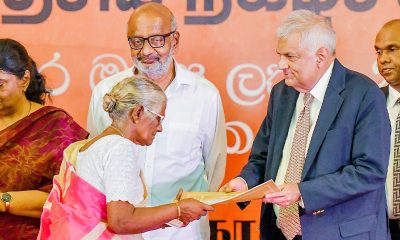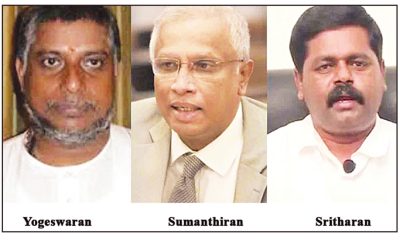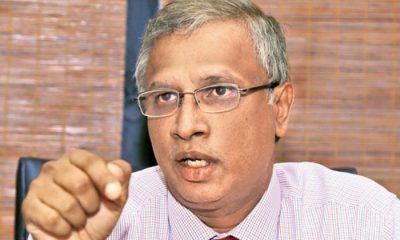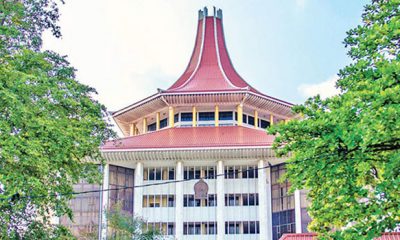Features
Rajapaksa loot can put economy right
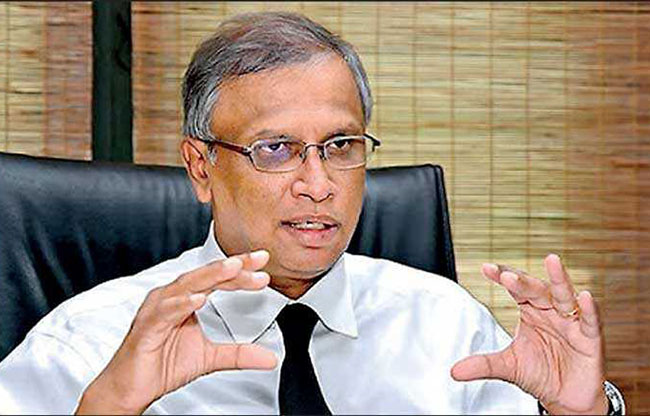
Budget speech by MA Sumanthiran, MP
Thank you presiding member for the opportunity to speak at the second reading of the budget proposals that have been presented to this House by his Excellency the President and Minister of Finance. Whenever I have spoken on the second reading and if it was the president who held the portfolio of finance, I have consistently raised my objection to that fact and I must place my objection today also.
I have said this since 2010. The reason is that the constitution says that public finance is a matter that is entirely in the preserve of Parliament, and therefore I take the view that it is only a Member of Parliament who is accountable to Parliament in that way, must hold the portfolio of finance.
His Excellency the President is not an MP, although he can attend Parliament and he can answer questions. I take the view that the chief of the executive, who is not a member of the legislature, should not hold the post of finance minister.
Having said that, I want to start by welcoming some of the proposals that have been made; for instance we welcome the increase in monthly cost of living allowance of public sector employees and pensioners. Although insufficient it is a welcome increase. Also the increase the monthly allowance for persons with disabilities, elderly citizens and kidney patients – are most welcome. Then expediting compensation for missing persons. There was a large sum that was allocated several years ago, that was not spent.
There is an amount in the Appropriation Act but over and beyond that His Excellency in his speech said, he is allocating a further sum to expedite the payment. Providing land ownership to farmers; Yes! that’s a very salutary proposal and we welcome that, fishery industry development in the northern region – a long felt need and in the budget proposal that has found mention and we welcome that. Construction of houses for internally displaced persons, initiating preliminary work for the water supply project in Jaffna: all of these are matters in the budget proposal that we welcome.
However, it is one thing to have these proposals and it is quite another thing to see them realized. So that is why we have reacted with scepticism, when even these welcome proposals are mentioned. We have tracked, or several agencies have tracked, the progress made on budget proposals. The Committee on Public Finance has been specially tasked to do this and between the years 2015 and 2019, I had the honour of chairing that committee.
And we started that process, but often came up against a blank wall because there was no information available. I must say the current chair, Hon. Dr. Harsha de Silva, is also taking a lot of effort to track (them) to see whether previous year’s budget proposals have been implemented or what percentage has actually been realised.
Only 8% of last year’s budget proposals have seen even some progress. On a stupendous 68% there has been has no information at all – no information at all! Then how can we be satisfied? How can we be happy that some progressive proposals have been made? All this amount to just words, and I urge, I urge the chair of the Committee on Public Finance to sit at least once a month and summon officials to disclose to that committee the progress made on each of these proposals. There must be a continuous assessment process. If not, Parliament cannot actually exercise that power over public finance.
I must say that the revenue proposals are wholly unrealistic and it is not this year alone that it is happening. If this is a trend, then we must know that those (proposals) are unrealistic. Even in the past years we have found that it’s a habit to over-estimate revenue and underestimate expenses. That’s how you show – at the budget proposal time at least – a smaller deficit knowing all too well that that is a false figure, that that deficit is much larger, several times more. So the revenue proposals are wholly unrealistic even now.
Even now the reason given for the increase in the VAT percentage is said to be that “revenue has not been collected as envisaged” – so we knew that well before, well before! How did we know that, because revenue has never been collected as anticipated or as disclosed as the revenue proposal. We know that. Now that is being said as the reason for burdening the entire population with the VAT rate increase.
If the Inland Revenue properly collected taxes from those who are obliged to pay taxes we obviously won’t be in this state. And that is why in its governance diagnostics, the IMF has correctly pointed to revenue collections authorities; the Customs, the Inland Revenue, (saying they) have been severely corrupt, high officials being corrupt. My only grouse with that report is that they left the political masters out of it. In fact, the revenue collection authorities are shielded and protected by political masters in office who are more corrupt than those officials themselves. That is the reason why the country went into bankruptcy.
There is also heavy disparity in allocations. Defence continues to be a high expenditure (item). We are said to have the 17th largest army in the world. For a small country such as ours – 17th largest – just the size of the army itself. I can understand when at a time when that was perhaps necessary. But 14 or 15 years after the internal strife ended, there doesn’t seem to have been any effort taken to demobilise the armed forces. That effort has not happened at all. And so we keep pumping money into a sector that is not necessary to be maintained in the current context.
And with regard to corruption, the Supreme court delivered a judgement yesterday – 265 pages, a most welcome judgement of the Supreme Court. Unfortunately it is a majority judgement, one judge, for reasons that he has stated, has dissented. That’s a four to one judgement holding the then President, ministers of finance who held that portfolio, governors of the central bank; the successive governors, secretary to treasury, advisor to the President, one member of the monetary board and the monetary board itself, are responsible for the collapse of the economy.
I want to recount a particular series of events. The advisor to the President Dr. P.B.Jayasundara, was found guilty by the supreme court in the case of Hon. Vasudeva Nanayakkara vs. K.N.Choksy and I must disclose my interest in this matter because I was the counsel who appeared for Hon. Vasudeva Nanayakkara. He (Jayasundera) was found guilty and fined Rs.500,000/- at that time by the supreme court.
He paid the fine. He was told that he cannot hold public office thereafter. He gave an affidavit to court stating that he will not hold any public office thereafter. Then there was a change in the office of the Chief Justice. And the new Chief Justice …(Interruption).. the Minister of Justice is asking to name the person, I will tell, it’s not wrong to name him.
The new Chief Justice Asoka de Silva constituted a court to which Dr P.B. Jayasundara made an application to withdraw his affidavit. Why? because then President Mahinda Rajapaksa insisted that P.B.Jayasundara and P.B.Jayasundara alone must be appointed Secretary to the Treasury. As counsel for Hon. Vasudeva Nanayakkara I objected to this. One day the full court sat – 10 judges sat, one judge was unavailable.
And then a seven-judge bench allowed it, with one dissenter, Hon. Shiranee Tilakawardane, wrote a dissenting judgement, a dissenting order, others allowed it. And he was appointed Secretary to the Treasury. The Chief Justice at that time who allowed it, the day after his retirement, became the legal advisor to the then President! So, corruption in high places is demonstrated by just this example. And now the Supreme Court again finds that President, his two brothers, Dr. P.B. Jayasundara and others responsible for the collapse of the economy.
There is one thing that they have not done, and that they should have done, the court should have done. In the Easter bombing case, for failure to prevent the attack the former President and several others were asked to pay hundreds of millions in compensation. But in yesterday’s judgment those who have been found guilty – found responsible for the economy collapsing in this country – don’t have to pay any compensation. The Court says petitioners did not ask for compensation. The court could have granted just and equitable relief – surely the Rajapaksa brothers have enough money to pay the 22 million people in this country.
Surely if the compensation had been ordered, all the money that is parked outside the country can be brought. The Minister of Justice himself said several people have parked money outside the country. It can be brought (back) and the country’s economy can be revived just on that alone. The country’s economy collapsed because country’s public money has been stolen by the President and his brothers and several others who worked with them. They have taken the money out of the country.
What the Supreme Court should have done is to have ordered them to pay compensation to every citizen of this country, and bring that money into the Treasury and that would have seen the revival of this country’s economy. This is not the end. Perhaps due to the nature of the proceeding in the Supreme Court, that is what the court has held. But I’m sure, (we) now must start a recovery process from those who have been held responsible by the Supreme Court. And every citizen of this country is entitled to make that claim, to ask them to bring the money back and make this economy stand back again.
Features
The heart-friendly health minister

by Dr Gotabhya Ranasinghe
Senior Consultant Cardiologist
National Hospital Sri Lanka
When we sought a meeting with Hon Dr. Ramesh Pathirana, Minister of Health, he graciously cleared his busy schedule to accommodate us. Renowned for his attentive listening and deep understanding, Minister Pathirana is dedicated to advancing the health sector. His openness and transparency exemplify the qualities of an exemplary politician and minister.
Dr. Palitha Mahipala, the current Health Secretary, demonstrates both commendable enthusiasm and unwavering support. This combination of attributes makes him a highly compatible colleague for the esteemed Minister of Health.
Our discussion centered on a project that has been in the works for the past 30 years, one that no other minister had managed to advance.
Minister Pathirana, however, recognized the project’s significance and its potential to revolutionize care for heart patients.
The project involves the construction of a state-of-the-art facility at the premises of the National Hospital Colombo. The project’s location within the premises of the National Hospital underscores its importance and relevance to the healthcare infrastructure of the nation.
This facility will include a cardiology building and a tertiary care center, equipped with the latest technology to handle and treat all types of heart-related conditions and surgeries.
Securing funding was a major milestone for this initiative. Minister Pathirana successfully obtained approval for a $40 billion loan from the Asian Development Bank. With the funding in place, the foundation stone is scheduled to be laid in September this year, and construction will begin in January 2025.
This project guarantees a consistent and uninterrupted supply of stents and related medications for heart patients. As a result, patients will have timely access to essential medical supplies during their treatment and recovery. By securing these critical resources, the project aims to enhance patient outcomes, minimize treatment delays, and maintain the highest standards of cardiac care.
Upon its fruition, this monumental building will serve as a beacon of hope and healing, symbolizing the unwavering dedication to improving patient outcomes and fostering a healthier society.We anticipate a future marked by significant progress and positive outcomes in Sri Lanka’s cardiovascular treatment landscape within the foreseeable timeframe.
Features
A LOVING TRIBUTE TO JESUIT FR. ALOYSIUS PIERIS ON HIS 90th BIRTHDAY

by Fr. Emmanuel Fernando, OMI
Jesuit Fr. Aloysius Pieris (affectionately called Fr. Aloy) celebrated his 90th birthday on April 9, 2024 and I, as the editor of our Oblate Journal, THE MISSIONARY OBLATE had gone to press by that time. Immediately I decided to publish an article, appreciating the untiring selfless services he continues to offer for inter-Faith dialogue, the renewal of the Catholic Church, his concern for the poor and the suffering Sri Lankan masses and to me, the present writer.
It was in 1988, when I was appointed Director of the Oblate Scholastics at Ampitiya by the then Oblate Provincial Fr. Anselm Silva, that I came to know Fr. Aloy more closely. Knowing well his expertise in matters spiritual, theological, Indological and pastoral, and with the collaborative spirit of my companion-formators, our Oblate Scholastics were sent to Tulana, the Research and Encounter Centre, Kelaniya, of which he is the Founder-Director, for ‘exposure-programmes’ on matters spiritual, biblical, theological and pastoral. Some of these dimensions according to my view and that of my companion-formators, were not available at the National Seminary, Ampitiya.
Ever since that time, our Oblate formators/ accompaniers at the Oblate Scholasticate, Ampitiya , have continued to send our Oblate Scholastics to Tulana Centre for deepening their insights and convictions regarding matters needed to serve the people in today’s context. Fr. Aloy also had tried very enthusiastically with the Oblate team headed by Frs. Oswald Firth and Clement Waidyasekara to begin a Theologate, directed by the Religious Congregations in Sri Lanka, for the contextual formation/ accompaniment of their members. It should very well be a desired goal of the Leaders / Provincials of the Religious Congregations.
Besides being a formator/accompanier at the Oblate Scholasticate, I was entrusted also with the task of editing and publishing our Oblate journal, ‘The Missionary Oblate’. To maintain the quality of the journal I continue to depend on Fr. Aloy for his thought-provoking and stimulating articles on Biblical Spirituality, Biblical Theology and Ecclesiology. I am very grateful to him for his generous assistance. Of late, his writings on renewal of the Church, initiated by Pope St. John XX111 and continued by Pope Francis through the Synodal path, published in our Oblate journal, enable our readers to focus their attention also on the needed renewal in the Catholic Church in Sri Lanka. Fr. Aloy appreciated very much the Synodal path adopted by the Jesuit Pope Francis for the renewal of the Church, rooted very much on prayerful discernment. In my Religious and presbyteral life, Fr.Aloy continues to be my spiritual animator / guide and ongoing formator / acccompanier.
Fr. Aloysius Pieris, BA Hons (Lond), LPh (SHC, India), STL (PFT, Naples), PhD (SLU/VC), ThD (Tilburg), D.Ltt (KU), has been one of the eminent Asian theologians well recognized internationally and one who has lectured and held visiting chairs in many universities both in the West and in the East. Many members of Religious Congregations from Asian countries have benefited from his lectures and guidance in the East Asian Pastoral Institute (EAPI) in Manila, Philippines. He had been a Theologian consulted by the Federation of Asian Bishops’ Conferences for many years. During his professorship at the Gregorian University in Rome, he was called to be a member of a special group of advisers on other religions consulted by Pope Paul VI.
Fr. Aloy is the author of more than 30 books and well over 500 Research Papers. Some of his books and articles have been translated and published in several countries. Among those books, one can find the following: 1) The Genesis of an Asian Theology of Liberation (An Autobiographical Excursus on the Art of Theologising in Asia, 2) An Asian Theology of Liberation, 3) Providential Timeliness of Vatican 11 (a long-overdue halt to a scandalous millennium, 4) Give Vatican 11 a chance, 5) Leadership in the Church, 6) Relishing our faith in working for justice (Themes for study and discussion), 7) A Message meant mainly, not exclusively for Jesuits (Background information necessary for helping Francis renew the Church), 8) Lent in Lanka (Reflections and Resolutions, 9) Love meets wisdom (A Christian Experience of Buddhism, 10) Fire and Water 11) God’s Reign for God’s poor, 12) Our Unhiddden Agenda (How we Jesuits work, pray and form our men). He is also the Editor of two journals, Vagdevi, Journal of Religious Reflection and Dialogue, New Series.
Fr. Aloy has a BA in Pali and Sanskrit from the University of London and a Ph.D in Buddhist Philosophy from the University of Sri Lankan, Vidyodaya Campus. On Nov. 23, 2019, he was awarded the prestigious honorary Doctorate of Literature (D.Litt) by the Chancellor of the University of Kelaniya, the Most Venerable Welamitiyawe Dharmakirthi Sri Kusala Dhamma Thera.
Fr. Aloy continues to be a promoter of Gospel values and virtues. Justice as a constitutive dimension of love and social concern for the downtrodden masses are very much noted in his life and work. He had very much appreciated the commitment of the late Fr. Joseph (Joe) Fernando, the National Director of the Social and Economic Centre (SEDEC) for the poor.
In Sri Lanka, a few religious Congregations – the Good Shepherd Sisters, the Christian Brothers, the Marist Brothers and the Oblates – have invited him to animate their members especially during their Provincial Congresses, Chapters and International Conferences. The mainline Christian Churches also have sought his advice and followed his seminars. I, for one, regret very much, that the Sri Lankan authorities of the Catholic Church –today’s Hierarchy—- have not sought Fr.
Aloy’s expertise for the renewal of the Catholic Church in Sri Lanka and thus have not benefited from the immense store of wisdom and insight that he can offer to our local Church while the Sri Lankan bishops who governed the Catholic church in the immediate aftermath of the Second Vatican Council (Edmund Fernando OMI, Anthony de Saram, Leo Nanayakkara OSB, Frank Marcus Fernando, Paul Perera,) visited him and consulted him on many matters. Among the Tamil Bishops, Bishop Rayappu Joseph was keeping close contact with him and Bishop J. Deogupillai hosted him and his team visiting him after the horrible Black July massacre of Tamils.
Features
A fairy tale, success or debacle

Sri Lanka-Singapore Free Trade Agreement
By Gomi Senadhira
senadhiragomi@gmail.com
“You might tell fairy tales, but the progress of a country cannot be achieved through such narratives. A country cannot be developed by making false promises. The country moved backward because of the electoral promises made by political parties throughout time. We have witnessed that the ultimate result of this is the country becoming bankrupt. Unfortunately, many segments of the population have not come to realize this yet.” – President Ranil Wickremesinghe, 2024 Budget speech
Any Sri Lankan would agree with the above words of President Wickremesinghe on the false promises our politicians and officials make and the fairy tales they narrate which bankrupted this country. So, to understand this, let’s look at one such fairy tale with lots of false promises; Ranil Wickremesinghe’s greatest achievement in the area of international trade and investment promotion during the Yahapalana period, Sri Lanka-Singapore Free Trade Agreement (SLSFTA).
It is appropriate and timely to do it now as Finance Minister Wickremesinghe has just presented to parliament a bill on the National Policy on Economic Transformation which includes the establishment of an Office for International Trade and the Sri Lanka Institute of Economics and International Trade.
Was SLSFTA a “Cleverly negotiated Free Trade Agreement” as stated by the (former) Minister of Development Strategies and International Trade Malik Samarawickrama during the Parliamentary Debate on the SLSFTA in July 2018, or a colossal blunder covered up with lies, false promises, and fairy tales? After SLSFTA was signed there were a number of fairy tales published on this agreement by the Ministry of Development Strategies and International, Institute of Policy Studies, and others.
However, for this article, I would like to limit my comments to the speech by Minister Samarawickrama during the Parliamentary Debate, and the two most important areas in the agreement which were covered up with lies, fairy tales, and false promises, namely: revenue loss for Sri Lanka and Investment from Singapore. On the other important area, “Waste products dumping” I do not want to comment here as I have written extensively on the issue.
1. The revenue loss
During the Parliamentary Debate in July 2018, Minister Samarawickrama stated “…. let me reiterate that this FTA with Singapore has been very cleverly negotiated by us…. The liberalisation programme under this FTA has been carefully designed to have the least impact on domestic industry and revenue collection. We have included all revenue sensitive items in the negative list of items which will not be subject to removal of tariff. Therefore, 97.8% revenue from Customs duty is protected. Our tariff liberalisation will take place over a period of 12-15 years! In fact, the revenue earned through tariffs on goods imported from Singapore last year was Rs. 35 billion.
The revenue loss for over the next 15 years due to the FTA is only Rs. 733 million– which when annualised, on average, is just Rs. 51 million. That is just 0.14% per year! So anyone who claims the Singapore FTA causes revenue loss to the Government cannot do basic arithmetic! Mr. Speaker, in conclusion, I call on my fellow members of this House – don’t mislead the public with baseless criticism that is not grounded in facts. Don’t look at petty politics and use these issues for your own political survival.”
I was surprised to read the minister’s speech because an article published in January 2018 in “The Straits Times“, based on information released by the Singaporean Negotiators stated, “…. With the FTA, tariff savings for Singapore exports are estimated to hit $10 million annually“.
As the annual tariff savings (that is the revenue loss for Sri Lanka) calculated by the Singaporean Negotiators, Singaporean $ 10 million (Sri Lankan rupees 1,200 million in 2018) was way above the rupees’ 733 million revenue loss for 15 years estimated by the Sri Lankan negotiators, it was clear to any observer that one of the parties to the agreement had not done the basic arithmetic!
Six years later, according to a report published by “The Morning” newspaper, speaking at the Committee on Public Finance (COPF) on 7th May 2024, Mr Samarawickrama’s chief trade negotiator K.J. Weerasinghehad had admitted “…. that forecasted revenue loss for the Government of Sri Lanka through the Singapore FTA is Rs. 450 million in 2023 and Rs. 1.3 billion in 2024.”
If these numbers are correct, as tariff liberalisation under the SLSFTA has just started, we will pass Rs 2 billion very soon. Then, the question is how Sri Lanka’s trade negotiators made such a colossal blunder. Didn’t they do their basic arithmetic? If they didn’t know how to do basic arithmetic they should have at least done their basic readings. For example, the headline of the article published in The Straits Times in January 2018 was “Singapore, Sri Lanka sign FTA, annual savings of $10m expected”.
Anyway, as Sri Lanka’s chief negotiator reiterated at the COPF meeting that “…. since 99% of the tariffs in Singapore have zero rates of duty, Sri Lanka has agreed on 80% tariff liberalisation over a period of 15 years while expecting Singapore investments to address the imbalance in trade,” let’s turn towards investment.
Investment from Singapore
In July 2018, speaking during the Parliamentary Debate on the FTA this is what Minister Malik Samarawickrama stated on investment from Singapore, “Already, thanks to this FTA, in just the past two-and-a-half months since the agreement came into effect we have received a proposal from Singapore for investment amounting to $ 14.8 billion in an oil refinery for export of petroleum products. In addition, we have proposals for a steel manufacturing plant for exports ($ 1 billion investment), flour milling plant ($ 50 million), sugar refinery ($ 200 million). This adds up to more than $ 16.05 billion in the pipeline on these projects alone.
And all of these projects will create thousands of more jobs for our people. In principle approval has already been granted by the BOI and the investors are awaiting the release of land the environmental approvals to commence the project.
I request the Opposition and those with vested interests to change their narrow-minded thinking and join us to develop our country. We must always look at what is best for the whole community, not just the few who may oppose. We owe it to our people to courageously take decisions that will change their lives for the better.”
According to the media report I quoted earlier, speaking at the Committee on Public Finance (COPF) Chief Negotiator Weerasinghe has admitted that Sri Lanka was not happy with overall Singapore investments that have come in the past few years in return for the trade liberalisation under the Singapore-Sri Lanka Free Trade Agreement. He has added that between 2021 and 2023 the total investment from Singapore had been around $162 million!
What happened to those projects worth $16 billion negotiated, thanks to the SLSFTA, in just the two-and-a-half months after the agreement came into effect and approved by the BOI? I do not know about the steel manufacturing plant for exports ($ 1 billion investment), flour milling plant ($ 50 million) and sugar refinery ($ 200 million).
However, story of the multibillion-dollar investment in the Petroleum Refinery unfolded in a manner that would qualify it as the best fairy tale with false promises presented by our politicians and the officials, prior to 2019 elections.
Though many Sri Lankans got to know, through the media which repeatedly highlighted a plethora of issues surrounding the project and the questionable credentials of the Singaporean investor, the construction work on the Mirrijiwela Oil Refinery along with the cement factory began on the24th of March 2019 with a bang and Minister Ranil Wickremesinghe and his ministers along with the foreign and local dignitaries laid the foundation stones.
That was few months before the 2019 Presidential elections. Inaugurating the construction work Prime Minister Ranil Wickremesinghe said the projects will create thousands of job opportunities in the area and surrounding districts.
The oil refinery, which was to be built over 200 acres of land, with the capacity to refine 200,000 barrels of crude oil per day, was to generate US$7 billion of exports and create 1,500 direct and 3,000 indirect jobs. The construction of the refinery was to be completed in 44 months. Four years later, in August 2023 the Cabinet of Ministers approved the proposal presented by President Ranil Wickremesinghe to cancel the agreement with the investors of the refinery as the project has not been implemented! Can they explain to the country how much money was wasted to produce that fairy tale?
It is obvious that the President, ministers, and officials had made huge blunders and had deliberately misled the public and the parliament on the revenue loss and potential investment from SLSFTA with fairy tales and false promises.
As the president himself said, a country cannot be developed by making false promises or with fairy tales and these false promises and fairy tales had bankrupted the country. “Unfortunately, many segments of the population have not come to realize this yet”.
(The writer, a specialist and an activist on trade and development issues . )


